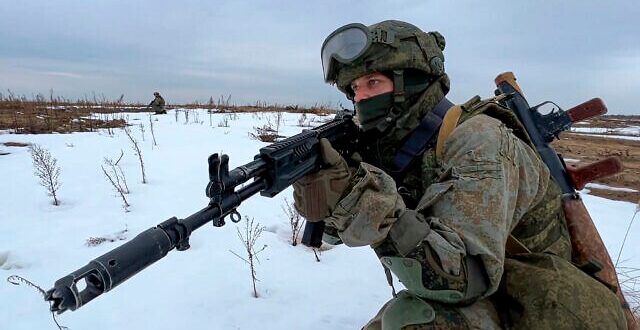US says it has observed significant Russian troop movement; Ukraine’s Zelensky to travel to Germany, meet Western leaders, though Biden says it’s unwise for him to leave country
Russian President Vladimir Putin will oversee major military drills on Saturday, further escalating tensions after Washington said Moscow would invade within days, and as Ukraine’s president headed to Europe to drum up support.
Artillery shelling in the east of Ukraine and orders from Russian-backed separatists for civilians to evacuate the region Friday inflamed an already febrile situation as Washington said Moscow was encircling its pro-Western neighbor.
The Kremlin continues to say it has no plans to attack.
However, a US defense official said Friday that more than 40 percent of the Russian forces on the Ukraine border are now in position for attack and Moscow has begun a campaign of destabilization.
The US, which estimates that Russia has placed more than 150,000 troops near Ukraine’s borders, has observed significant movements since Wednesday, the official said, insisting on anonymity.
“Forty to fifty percent are in an attack position. They have uncoiled in tactical assembly in the last 48 hours,” the official told reporters.
Tactical assembly points are areas next to the border where military units are set up in advance of an attack.
The official said Moscow had massed 125 battalion tactical groups close to the Ukraine border, compared to 60 in normal times and up from 80 at the beginning of February.
The Russians have never given a figure for the deployment along the border with Ukraine nor how many are taking part in ongoing drills with neighboring Belarus.
Meanwhile, Russia on Saturday denied involvement in a cyberattack earlier in the week on Ukraine’s defense ministry and armed forces as well as two state banks.
The statement by the Russian Embassy in Washington came after the US accused Moscow of responsibility.
“We categorically reject these baseless statements of the administration and note that Russia has nothing to do with the mentioned events and in principle has never conducted and does not conduct any ‘malicious’ operations in cyberspace,” read the tweet from the embassy’s account.
US President Joe Biden said Friday that Russia’s invasion of Ukraine would come in the next week or days and that Putin had “made the decision” to invade. But Biden left the door open for a diplomatic resolution.
Ukrainian President Volodymyr Zelensky was due to travel to Germany Saturday to meet Western leaders, with talks between him and US Vice President Kamala Harris expected.
However, Biden questioned whether it was a “wise choice” for Ukraine’s leader to leave his country as war fears reached a fever pitch.
Biden again ruled out sending US troops into Ukraine, but his administration reiterated that it would hit Moscow with costly sanctions that would transform Russia into “a pariah to the international community.”
Fears of a spark
There were growing fears that a spark, which Washington warns could be a deliberate “false flag” incident orchestrated by Moscow, could set off the largest military confrontation in Europe since World War II.
NATO chief Jens Stoltenberg, attending the Munich Security Conference, warned the size of the assembled Russian force far exceeded that needed for military drills, and that Russia had the capacity to invade without warning.
France and Germany have urged Russia to use its influence on rebels in Ukraine’s disputed east to “encourage restraint and contribute to de-escalation.”
But on the ground, a spike in clashes has fed a growing sense of dread.
Monitors from the Organization for Security and Co-operation in Europe said Saturday they had seen a significant rise in the number of attacks along the front line, particularly in the separatist areas of Donetsk and Lugansk.
Officials told local media that 25,000 people had left Lugansk and more than 6,000 had left Donetsk for Russia.
There were reports of long car queues at checkpoints in Donetsk.
Seeking to reverse the aggressor narrative, Moscow-backed leaders have accused Kyiv of planning an offensive to retake the eastern territories. The evacuations of civilians there were said to be in response to worries about a government attack.
Russian news agencies quoted officials in Lugansk saying there had been two explosions within an hour on a gas pipeline but the fires were under control.
But US Secretary of State Antony Blinken, who will meet his Russian counterpart for talks Thursday, accused the Kremlin of mounting a propaganda campaign to create an excuse for war.
 Eurasia Press & News
Eurasia Press & News



